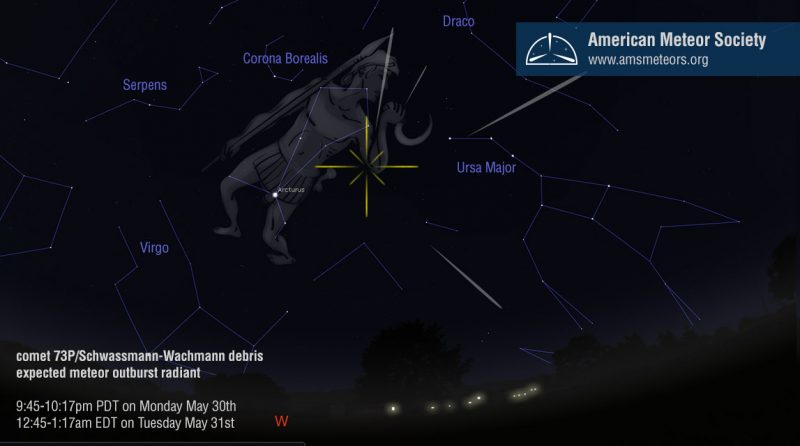Science
Related: About this forumWill the Tau Herculid meteors produce a storm? (earthsky.org) {May 30 PM-31 AM}
Posted by
Don Machholz
and
May 26, 2022
Intense meteor display possible from comet SW3
Heads up! On May 30-31, 2022, we might have a brief-but-intense meteor display, thanks to a comet that split apart in 1995 and is apparently still fragmenting. It might happen, as Earth passes through a particularly dense stream of icy particles which the comet left behind in the years 1995, 1897 and 1892.
If it does happen, we’ll see a grand display of meteors! And, even if it doesn’t, this comet is one you’ll want to come to know.
The meteor shower is the Tau Herculids. Its parent comet is 73P/Schwassmann-Wachmann 3, aka SW3. Astronomers found this comet in 1930. It orbits the sun every 5.4 years. And the comet will be in our evening sky again, in July and August 2022. It’s not an intrinsically bright comet. But it’s an exceptionally interesting comet. In 1995, astronomers watched as this comet began to fracture and litter its orbit with an increasing amount of debris.
That’s why, by some recent calculations, the May 2022 Tau Herculid meteor shower – spawned by SW3 – might be an intense display. Bill Cooke, who leads NASA’s Meteoroid Environment Office, said:
This is going to be an all or nothing event. If the debris from SW3 was traveling more than 220 miles per hour (354 kph) when it separated from the comet, we might see a nice meteor shower. If the debris had slower ejection speeds, then nothing will make it to Earth and there will be no meteors from this comet.
***
Calculations by different teams have provided three different peaks, all within a 22-minute time span. The most recent one places the peak at 05:04 UTC on May 31, 2022. For much of the Western Hemisphere, this translates to Monday night, May 30-31. It would be 10:04 p.m. PDT (North American west coast), 11:04 p.m. MDT, 12:04 a.m. CDT early on the morning of May 31 (central North America), and 1:04 a.m. EDT on May 31 (eastern North America). Translate 5:04 UTC on May 31 to your time zone.
The other two teams produced similar times: 04:55 UTC and 05:17 UTC.

***
more (detailed article): https://earthsky.org/astronomy-essentials/tau-herculid-meteors-may-intense-shower/?utm_source=EarthSky+News
SergeStorms
(19,399 posts)If the weather cooperates I'll be out checking the night sky. I love star gazing.
Thanks again for the tip. ![]()
Easterncedar
(3,866 posts)Thanks!